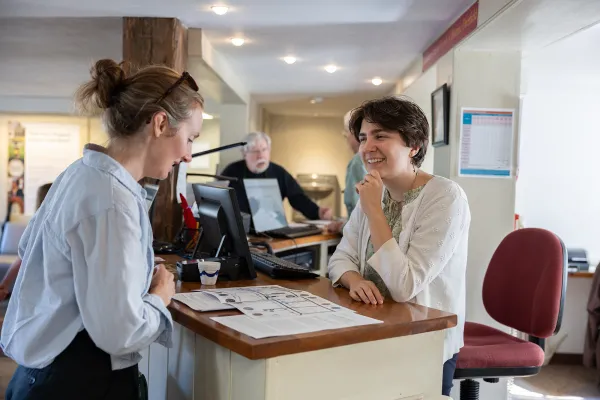Lessons from the Job Market
Smith Quarterly
New grads focus on short-term goals and unexpected opportunities
Ella McDaniel ’25 greets visitors at Historic Deerfield. Photo by Jessica Scranton
Published November 17, 2025
“Welcome to the first day of the rest of your life.”
It’s a phrase usually meant to spark excitement and optimism about the road ahead, but for graduates entering today’s unsteady job market—especially in fields like politics, international affairs, and the arts—it’s a sentiment that can add unnecessary pressure to an already stressful time.
Deborah Wijnhoven, assistant dean of employer partnerships and career communities at the Lazarus Center for Career Development, is working to alleviate that anxiety by helping Smithies see their futures through a more focused, short-term lens. She and her team help connect students with employers and job opportunities in a wide variety of fields through campus visits, alum panels, industry site visits, and other specialized programming.
Because of the ongoing changes in the job market, there’s an added emphasis on the importance of networking with alums early and often. “Alums have been able to open doors and give access, advice, and support,” Wijnhoven says. “They’re one of the biggest strengths at Smith.” Wijnhoven and other Lazarus staff are also focusing their conversations with students on transferable skills that can be applied to a multitude of fields, making for a more flexible future.
“I always say to students that they’re not making a career choice at this age and stage,” Wijnhoven says. “Instead, I want them to be thinking, ‘How will I strategically use the next 12 to 18 months to leverage future opportunities?’”
It’s a mindset some students and members of the class of 2025 are embracing as they embark on job searches—by either pivoting completely or at least pressing pause on long-term career plans—in a market that looks much different than they’d envisioned.
Ella McDaniel ’25—an anthropology major with a museum studies concentration and a Spanish minor—knew she wanted to spend time working before entering graduate school, but that’s as far as her plans went. After researching AmeriCorps as a potential next step, she discovered FoodCorps, a program where members teach young students how to grow and cook fresh, healthy food and help schools serve more of that kind of food.
“It was great for so many reasons,” recalls McDaniel, of Greenfield, Massachusetts. “It was close to home, was going to last about a year, and was going to involve working for a cause I care about.” Unfortunately, FoodCorps was caught in the crosshairs of recent ongoing cuts to federal programs; on the same day that she moved out of her house at Smith, McDaniel learned that the organization wouldn’t be operating in Massachusetts this year.
With FoodCorps off the table, McDaniel utilized connections from previous internships and other opportunities to secure a handful of part-time jobs—including one as a visitor services associate and museum aide at a local museum, Historic Deerfield—so she could save money and figure out next steps. “I’m also really grateful for Smith’s alumnae network, as it makes the uncertain job search process somewhat less daunting,” she says. “It’s so comforting to realize that other people my age, across disciplines, are going through similar struggles with their careers. I treasure my Smith friends and girlfriend and lean on them as I continue to push forward.”
In Washington, D.C., Tallulah Costa ’25 had hoped to use her degree—a government major with a concentration in American politics, as well as a minor in the study of women and gender—within a vastly different administration. She quickly shifted gears: After navigating the hurdles of hiring freezes and interviewing for federal jobs that disappeared shortly thereafter, she set her sights on Congress.
“I spent some time applying to private sector and nonprofit jobs, but most of my energy went to Congressional applications,” Costa says. “The thing about getting your foot in the door on Capitol Hill, though, is that there are these very intentionally designed pathways for you to enter. As a recent grad, you essentially need someone to flag your résumé.”
Costa echoes McDaniel’s praise of members of the Smith alum network, citing their role in helping her approach an especially intricate and delicate job market. “There are a handful of alums who work in both the Senate and in the House as staff who I know and have reached out to for advice before. Becca Damante [’17] was also monumentally helpful in figuring out how to approach the job search on the Hill.”
After several interviews but no job offers, Costa eventually landed a legislative internship in the office of U.S. Representative Jim McGovern, a Democrat from Massachusetts—a role that wrapped up at the end of the summer.
Her plans for what’s next?
“I’m going to see how it goes,” she says. “Midterm campaign season for the House will really kick off in April. That might be a good time, because if Democrats take back the House then they’ll need staff, and there’ll be more job opportunities in Congress again, so I’m also going to keep an eye on that. We’ll see.”
That ability to stay flexible will be key for graduates, especially for seniors already considering their post-college plans. While jumping into an uncertain job market is new to many members of the class of 2025, it’s a storm Wijnhoven has helped alums weather before. She’s been at Smith for nearly 30 years, and still remembers the uncertainty and tumult that came with the 2008 financial crisis—as well as the successes Smithies found once the dust settled.
“Smith students are smart. They’re hardworking. They get such a foundation at Smith that really does give them what they need to be successful,” she says. “Right now, they have to be creative in how they’re searching and who they’re connecting with, but at the end of the day, Smith students always land on their feet.”
